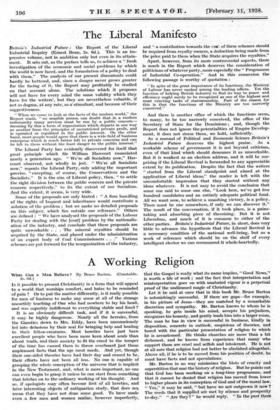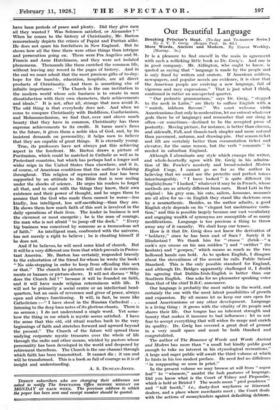A Working Religion What Can a Man Believe ? By
Bruce Barton. (Constable. 3s. ed.) Is it possible to present Christianity in a form that will appeal to a world that worships comfort, and hates to be reminded of pain ? Or to put the matter differently, is it really possible for men of business to make any sense at all of the strange unearthly teaching of One who had nowhere to lay his head, and was superbly indifferent to everything stable and fixed ?
It is an obviously difficult task, and if it is successful, it may be highly dangerous. Nearly all the heresies, from the Gnostics down to Mrs. Eddy, have been unconsciously led into delusions by their zeal for bringing help and healing to their fellow-creatures. Most heretics have just been excellent people who have been more keen about souls than about truth, and their anxiety to fit the creed to the temper of the time has caused them to throw overboard just those unpleasant facts that the age most needs. And yet, though their one-sided theories have had their day and ceased to be, their efforts have not been all loss. No one -is capable of grasping the whole conception of the universe that is implicit in the New Testament, and, what is more important, no one can even begin to grasp it unless he can start from something that hitches on to the-ordinary working of his thought. And so, if apologists may often become first of all heretics, and later interesting objects of antiquarian study, that does not mean that they have not done some good. To have made even _a. few men- and women realize, - however imperfectly, that the Gospel is really what its name implies, " Good News," is worth a life of work ; and the fact that interpretation and reinterpretation goes on with unabated vigour is a perpetual proof of the undimmed magic of Christianity. •
Let it be said at once that in this book Mr. Bruce Barton is astonishingly successful. If there are gaps—for example, in his picture of Jesus—they are matched by a remarkable discretion and sympathy. Mr. Barton knows to whom he is speaking, he gets inside his mind, accepts his prejudices, recognizes his honesty, and gently leads him into a larger room. The man he has in view is successful in business, kindly in disposition, concrete in Outlook; suspicious of theoriei, and bored with the particular presentation of religion to which he is accustomed. He thinks churches are more Thin a bit di,shonest, and he knows from experience that many who support them are cruel and selfish and intolerant. He is not at all sure that religion had not better be abolished altogether. Above all, if he is to be moved from his position of doubt, he must have facts and not speculations.
Mr. Barton in no way minimizes the blots of cruelty and superstition that mar the history of religion. But he points out that God has been working on a long-time programme, and that it cannot be denied that religion has moved from lower to higher planes in its conception of God and of the moral law. " Yes," it may be said, "• but have we not outgrown it now ? The needs that it supplied are met by science and prosperity to-day." " Are they ? " he would reply. " In the past therd have been periods of peace and plenty. Did they give men all they wanted ? Was Solomon satisfied, or Alexander ? When he comes to the history of Christianity, Mr. Barton remorselessly depicts the crimes of Papist and PUritin He does not spare his forefathers in New England. But he shows how all the time there were other things than intrigue and persecution going on. There were Fm Angelico and St.
. Francis and Anne Hutchinson, and they were not isolated phenomena. Thousands like them enriched the common life, without leaving any record in the pages of history. And in the end we must admit that the most precious gifts of to-days hope for the humble, education, hospitals, are all direct products of Christianity. And there is something else of infinite importance. " The Church is the one institution in the modern world whose sole business is to create in men dissatisfaction with their own characters, their achievements and ideals." It is not, after all, strange that men avoid it. The odd thing is that everybody does not. And when we come to compare Christianity with Buddhism, Confucianism, and Mohammedanism, we find that, over and above much beauty that they have in common, Christianity has three supreme achievements to its credit. It turns men's faces to the future, it gives them a noble idea of God, and, by its insistent demands on personality, it helps men to believe that they are capable of great things. It is eternally young.
True, its professors have not always put this achieving aspect in the forefront. Mr. Barton draws a picture of Puritanism, which could be matched in Catholic as well as in Protestant countries, but which has perhaps had a longer and wider reign in the United States than elsewhere, and it is, of course, of American conditions that the author is thinking throughout. This religion of repression and fear has been supported by an attitude to the Bible that is now reeling under the shocks of science. He urges his readers to forget all that, and to start with the things they know, their own existence and their power of thought, and he urges them to assume that the God who made them cannot be worse—less
kindly, less intelligent, less self-sacrificing—than they are. lig shows them how much faith of this sort is involved in the
daily operations of their lives. The leader in business is not the cleverest or most energetic ; he is the man of courage, the man who is not afraid " to jump off the dock." " Every big business was conceived by someone as a tremendous act of faith." An intelligent man, confronted with the universe, has not merely a right to believe ; he is cheating himself if he does not.
And if he believes, he will need some kind of church. But it will be a very different one from that which prevails in Protes- tant America. Mr. Barton has certainly responded bravely to the exhortation of the friend for whom he wrote the book : " No side-stepping in order to keep from offending this sect
or that." The church he pictures will not deal in entertain- ments or bazaars or picture-shows. It will not discuss " Why does the Church fail ? " because it will be founded on faith, and it will have made religion coterminous with life. It Will not be primarily a social centre or an intellectual head- quarters, but an oasis of reverence and giver of peace, always open and always functioning. It will, in fact, be more like Catholicism :—" I have stood in the Russian Cathedral . . . listening to the deep bass notes of its glorious chants. There is no sermon ; I do not understand a single word. Yet some- how the thing in me which is mystic seems satisfied. I have the sense that this old, old ritual reaches back to the very beginnings of faith and stretches forward and upward beyond tie_ present." The Church of the future will spread these undying corporate mystic treasures over the whole of life through the radio and other means, wielded by pastors whose personality has been developed in the world and deepened by retirement therefrom. The Church is the one channel through which faith has been transmitted. It cannot die ; it can and will be transformed. This is a book as full of courage as it is of insight and understanding. .
A. S. DUNCAN-JONES.







































 Previous page
Previous page